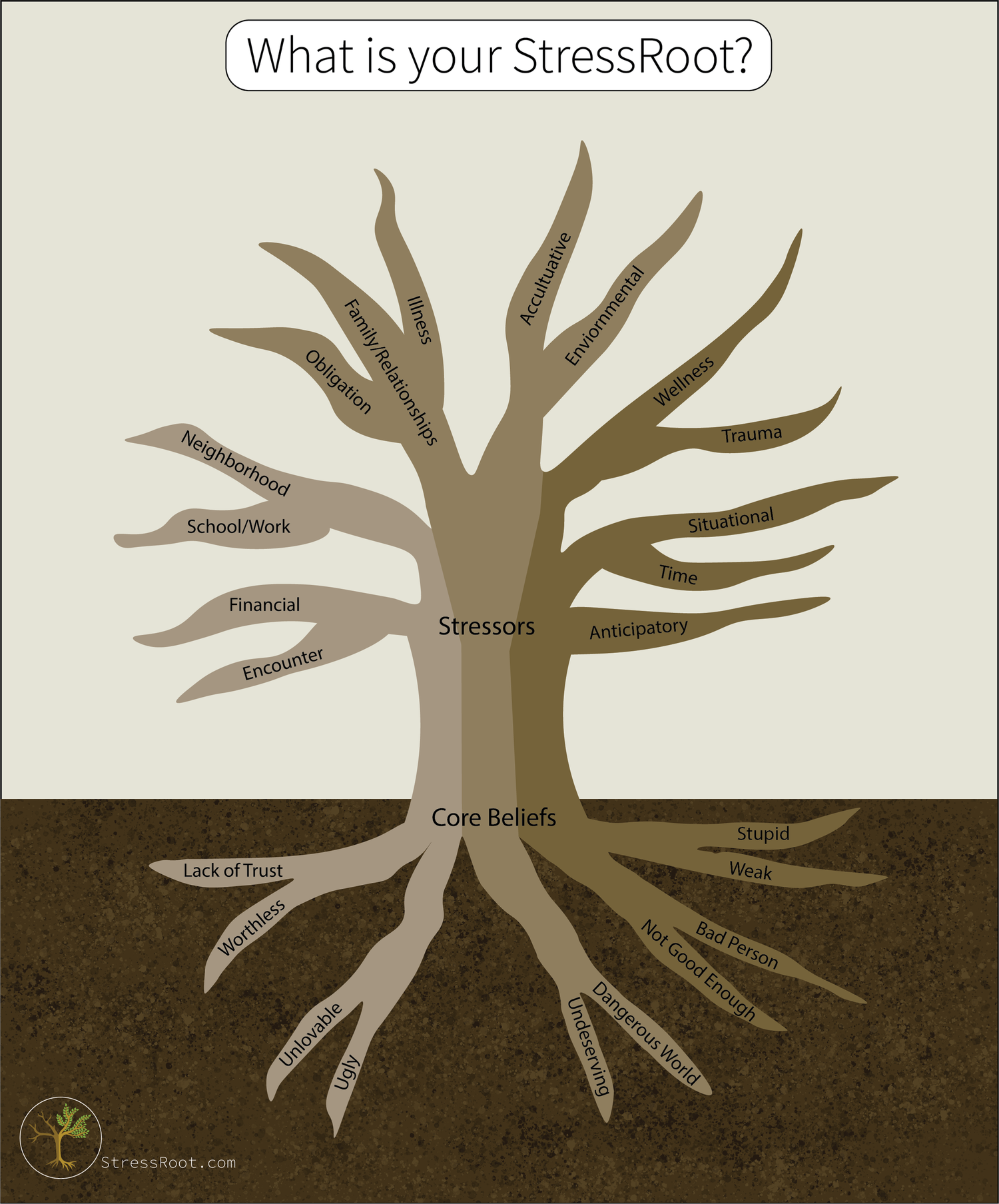Core Beliefs: The Invisible Roots of Stress
Feeling stuck in a cycle of stress and negative self-talk, where surface-level issues like work pressures or relationship conflicts never seem to improve because the deeper root causes—such as "I'm not good enough" or "The world is unsafe"—remain unaddressed.
This can leave you feeling overwhelmed, emotionally drained, and unsure of how to break free or find lasting relief.
How can you start making a change?
Imagine a tree—strong, tall, with branches that stretch outward and roots that dig deep into the soil. The tree's health depends not only on its visible parts but also on what lies beneath the surface. Similarly, stress in our lives often stems from what lies beneath: our core beliefs about ourselves and the world.
This concept is beautifully captured in the image above, where the roots of the tree represent core beliefs, the trunk symbolizes stressors, and the branches show how stress manifests in different areas of life. As a therapist, I’ve seen how these roots—those core beliefs—can either nourish us or contribute to chronic stress. Let’s explore this further.
Core Beliefs: The Invisible Roots of Stress
At the very bottom of the tree, in the soil, lie core beliefs—deeply ingrained ideas about who we are, how we fit into the world, and what we deserve. These beliefs often form early in life, influenced by experiences, relationships, and cultural messages. For example:
“I’m not good enough.”
“The world is a dangerous place.”
“I’m unworthy of love or success.”
These beliefs are not always obvious. They operate silently in the background, shaping how we interpret life events. For instance, someone who believes they are “not good enough” may find constructive feedback at work deeply distressing, interpreting it as a personal failure rather than an opportunity for growth.
Stressors: The Trunk That Connects Beliefs to Life
The trunk of the tree represents stressors—specific challenges and situations we face in life. These stressors could include financial struggles, workplace pressures, family conflicts, or health concerns. While stressors are often external, the way we perceive and react to them is deeply influenced by our core beliefs.
For instance, two people may face the same financial hardship, but their experience of stress may differ drastically. If one person has a core belief of “I’m capable and resourceful,” they might approach the situation as a problem to solve. Meanwhile, someone with the belief “I’m doomed to fail” might feel overwhelmed and paralyzed.
Branches: The Visible Impact of Stress
The branches of the tree represent how stress manifests in our lives. These could include physical symptoms like fatigue or illness, emotional responses like anxiety or anger, and relational struggles like conflict with loved ones.
When core beliefs and stressors remain unaddressed, the branches grow heavier and more tangled. This can create a cycle where unresolved stress reinforces negative core beliefs, making it even harder to break free.
Breaking the Cycle: Nurturing Healthy Roots
As a therapist, I often help clients explore the roots of their stress. By uncovering and challenging core beliefs, it’s possible to create healthier, more supportive thoughts that lead to a more balanced life. Here are some ways to start this process:
Identify Your Core Beliefs
Reflect on moments of stress and ask yourself: “What does this situation say about me?” The answers can reveal underlying beliefs.Challenge Negative Beliefs
Ask: “Is this belief really true? What evidence do I have for and against it?” For example, if you believe “I’m unlovable,” look for times in your life where you’ve been shown care and affection.Replace Harmful Beliefs with Healthier Ones
Once you’ve identified and challenged a negative belief, replace it with something more supportive. For instance, “I’m not good enough” can become “I am a work in progress, and that’s okay.”Practice Self-Compassion
Be kind to yourself when stress arises. Remind yourself that it’s normal to feel overwhelmed sometimes and that you’re doing your best.Seek Support
Working with a therapist can help you navigate this process more effectively. A trained professional can provide tools and insights to dig deep into your roots and nurture healthier growth.
Do you want support to implement these strategies?
Not sure how to implement this or still feeling stress, be in touch. I am here to help you. Contact me to schedule a free consultation session.
